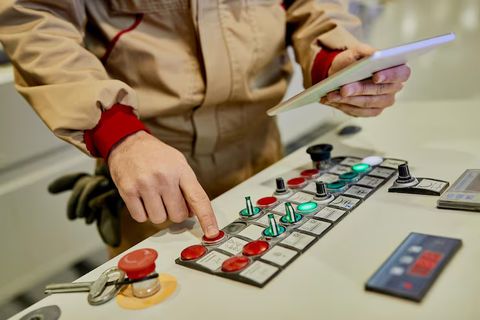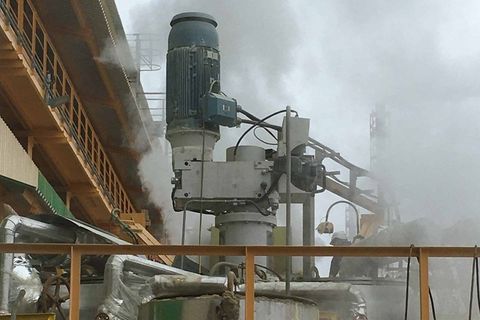What are Industrial Chillers?
Industrial chillers are specific pieces of equipment used for cooling different processes and facilities and providing proper conditions for various equipment operations. They come in two primary types: they are classified as; Air-cooled and Water-cooled. Both types are meant for cooling but work in different ways and are used in different conditions. Of course, these are differences that play a decisive role in choosing the right chiller for your application.
Air-Cooled Chillers
Air-cooled chillers employ air to remove heat from the refrigerant commonly drawn from the surrounding environment. They are usually fitted outside and are made of a fan unit that is designed to pass air over the condenser coils to relieve heat. These air-cooled industrial chillers are not as complex in their construction and are generally easier to install than the others.
Advantages
Ease of Installation: Chillers that are air-cooled are easy to install because the cooling tower is not needed. As a result, there are no requirements like water must be on the roof or similar, and positioning this chiller with good airflow comes as a bonus, which makes installing industrial air-cooled chillers in Nairobi relatively easy compared to water-cooled chillers.
Lower Initial Cost: Normally, air-cooled industrial chillers are cheaper in initial installation because they do not require a cooling tower. This makes them a more attractive initial investment since they do not demand significant financial investment to establish.
Less Maintenance: Industrial air-cooled chillers in Kenya are more compact and require less maintenance, as they have fewer parts and the system does not need a cooling tower. This simplicity reduces the costs of maintenance as well as the number of potential breakdowns during operation.
Disadvantages
Higher Operating Costs: Air-cooled chillers are slightly less efficient than water-cooled chillers, especially in regions with high temperatures and humidity. This can lead to increased energy consumption, reduced efficiency, and higher costs, particularly during hot periods.
Larger Footprint: Air-cooled chillers are generally larger in size because of the airflow requirement over the condenser. This can be a disadvantage in areas where space is limited.
Water-Cooled Chillers
Water-cooled chillers make use of a cooling tower, where water is used to absorb and discharge heat from the refrigerant. These industrial water chillers in Nairobi are normally placed indoors and need a cooling tower to release heat into the atmosphere.
Advantages
Higher Efficiency: Most water-cooled chillers are considered more efficient than air-cooled ones. They are always reliable and offer enhanced performance in hot conditions since water can effectively be used for cooling.
Energy Savings: Generally, water-cooled chillers are more energy efficient compared to air-cooled ones. This efficiency translates into lower operating costs over time, making industrial water chillers in Nairobi a more economical choice in the long term.
Disadvantages
Higher Initial Cost: Water-cooled chillers are more expensive upfront since they require a cooling tower and additional equipment. This initial cost can be prohibitive for some businesses.
Increased Maintenance: Water-cooled systems require more maintenance due to the presence of a cooling tower and water treatment systems, which may lead to increased servicing requirements compared to air-cooled chillers. When selecting the right chiller, consider ac air conditioning company in Nairobi for guidance on the cooling solutions that best suit your operational needs, space, and budget.
Factors to Consider When Choosing a Chiller
The following are some things people need to have in mind when selecting the right chiller:
1. Cooling Capacity
Determine the necessary cooling capacity in accordance with the heat load of the equipment or processes implemented in the premises. It is also important that the chiller is sized correctly such that it is capable of delivering the amounts of cooling that is required in order to avoid overloading of the chiller and failure of the system.
2. Energy Efficiency
Check the efficiency of the chiller models that you are thinking of buying. The problem is that high-efficiency models can be more expensive initially, but they will eventually save a company money on electricity consumption during their lifetime.
3. Space Availability
Look at the space of the building that is available for the installation. Air-cooled chillers, on the other hand, need more external space for cooling while a water cooled type, needs both the space for the chiller and the cooling tower.
4. Maintenance Requirements
Analyze the required maintenance of different types of chillers. Typically air-cooled chillers have lesser maintenance requirements, on the other hand water cooled chillers require additional maintenance because of the cooling tower and water treatment.
5. Environmental Considerations
Consider the external conditions which could be the temperature and the level of humidity. Air cooled chillers might not be as efficient as water cooled chillers particularly in hot conditions whereas the reverse is the case in comparatively cooler conditions.
Top Brands and Models
Trane Air-Cooled Chillers: Trane air-cooled chillers are among the best in the market as relate to the machines’ high reliability and performance. Trane has a wide options displayed, covering each industrial cooling service in a way that is most efficient. Its chillers have a high performance rating, which can be obtained regardless of the prevailing climate in the areas where such equipment is to be deployed. Trane has good products that contribute to cooling and facility operations. Standard air-cooled chillers from Trane cost between $15,000 and $45,000 depending on the model and its capacity.
Carrier Water-Cooled Chillers: Carrier’s water-cooled chillers are widely appreciated for relatively high performance as well as the extended term reliability in numerous procedures in the industrial sector to which they are mainly applied. These chillers provide the most advanced and innovative cooling and are not only designed but constructed for high capacity use. Carrier’s chillers contain modernity in terms of energy control in its construction for industrial requirements to have dependable cooling while embracing upgraded technology on energy utilization. Carrier water-cooled chillers are usually priced from $20000 to $60000 according to the production capacity and style.
Daikin Air-Cooled Chillers: Daikin designs their air-cooled chillers to be technologically sophisticated and loaded with features that effectively enhance the capacity of their chillers to cool and minimize the power that is used. Well suited to almost any industry, these chillers have new addendums improving performance and lowering cost of operation. Of the two strategies, such innovations assure the facilities to be endowed with the best cooling capacities for a longer time and durability hence making Daikin to be the best solution in present industrial cooling mechanisms. Daikin air-cooled chillers’ prices lie between $18, 000 to $ 55, 000 depending on the model and its specifications.
York Water-Cooled Chillers: York water-cooled chillers are some of the most reliable and high efficiency chillers designed specially for industrial uses. These chillers are ideal for high cooling loads and constructed to give the maximum performance for quite some time. York’s commitment is on quality and performance and as such assure that water-cooled chillers supplied provide sufficient and efficient cooling services under conditions. York also assembles sturdy and also integrates modern technology to offer satisfactory cooling in industrial application. York water-cooled chillers come in different models and cooling capacity thus the price tag may cost between $22, 000 and $65, 000.
Global Developments in Industrial Chillers
Lately, the market for industrial chillers, especially the air-cooled and water-cooled systems, has witnessed new innovations in technology and increased environmental consciousness. Some of the regions in the world, for instance, Bahamas NAS, are seeing trends related to environmental standards of the techniques used in chilling, which comprise energy efficiency. With the help of IoT and advancements in monitoring systems, manufacturer firms have started implementing smart technologies to enhance their operations and energy productivity.
The rise of industrial water chiller units in Nassau reflects the growing demand for effective climate control solutions. Additionally, the focus on environmentally friendly refrigerants has been significant in reducing environmental impacts. The need for effective climate control in value chains, ranging from hospitality to manufacturing, is encouraging the design of differentiated chillers to suit specific sector requirements.
For example, air blast coolers in Bahamas and water cooled process chillers in Bahamas are becoming popular options. Moreover, companies are exploring larger solutions such as the 500 ton water cooled chiller in Nassau to meet their cooling needs. The convair evaporative cooler in Bahamas is also gaining attention for its efficiency. With businesses in Nassau and the Bahamas increasingly demanding efficient and sustainable cooling systems, anticipations arise from global advancements in chillers to enhance performance, efficiency, and reduce environmental impacts to improve industrial uses.
Conclusion
Choosing the right industrial chiller is an important step that will affect the work of the facility and its expenses in the future. When considering between air-cooled and water-cooled chillers, you stand to gain insights on the strengths and weaknesses of the two systems: important aspects such as cooling capacity, efficiency, and maintenance requirements can be well understood. It is good to seek advice from an expert and buy a chiller that meets your needs most and will not dent your pocket in terms of the bills that you will be incurred later.






